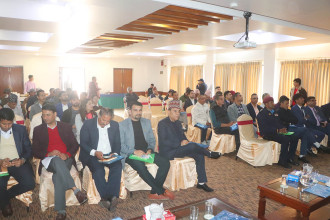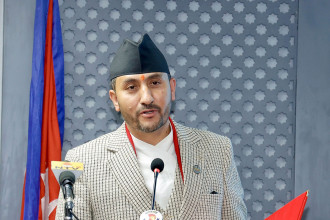-1752134630.jpeg)
KATHMANDU: Nepal Institute for International Cooperation and Engagement (NIICE) organised a high-level seminar on ‘Terrorism in South Asia: Challenges to Regional Peace and Security’ in Kathmandu on Wednesday.
Sunil Bahadur Thapa, adviser to the President and former industry minister, warned that UN-designated groups such as Lashkar-e-Taiba (LeT) and Jaish-e-Mohammed (JeM) maintain historical ties to al-Qaeda and operate from Pakistan, posing risks to India and potentially using Nepal as a transit point.
Dr Minendra Rijal, former defence minister, stressed that any attack on India would have spillover effects in Nepal. He said Pakistan’s promotion of terrorism had rendered SAARC inactive, hindered regional economic integration and inflicted significant losses on Pakistan’s economy. He called for global unity akin to the solidarity shown after the September 11 attacks in the United States to tackle terrorism effectively.
Chanda Chaudhary, member of parliament and former minister for women, children and senior citizens, highlighted the importance of curbing money laundering to prevent cross-border terrorism.
Shisir Khanal, former minister, welcomed India’s immediate and forceful military action under 'Operation Sindoor' and the expulsion of Pakistani diplomats, asserting that these measures set a new benchmark in regional counter-terrorism.
Dr Dinesh Bhattarai, former diplomat and adviser to the prime minister, described the Pahalgam attack as the deadliest in recent memory, noting that victims were forced to disclose their religion before being shot in the head.
NP Saud, former foreign affairs and irrigation minister, urged Nepal and its neighbours to develop a clear mechanism to control terrorism, warning that the threat is indiscriminate.
Dr Purna Silwal, former Major General in the Nepali Army, emphasised that double standards must be avoided if counter-terrorism efforts are to succeed.
-1752134630.jpeg)
-1752134630.jpeg)
-1752134630.jpeg)
-1752134629.jpg)
-1752134630.jpeg)
-1752134628.jpeg)
-1752134628.jpeg)
-1752134628.jpeg)
-1752134628.jpeg)
Ambassador Madhu Raman Acharya, former foreign secretary, stressed the need for intelligence sharing and joint border patrols between India and Nepal, affirming Nepal’s solidarity with India in the fight against terrorism.
Sumitra Karki, Director of NIICE, referred to the hijacking of Indian Airlines Flight IC-814 from Kathmandu by Harkat-ul-Mujahideen and the April terror attack in Pahalgam by Pakistan-based Lashkar-e-Taiba, which killed 26 civilians, including one Nepali national, to illustrate Nepal’s vulnerability.
Dr Pramod Jaiswal, research director at NIICE, characterised Pakistan as the epicentre of terrorism in South Asia, alleging that it had supported, funded and trained terrorists for nearly three decades to serve US, UK and other Western interests—a claim he said had been admitted by Pakistan’s Defence Minister Khawaja Muhammad Asif.
The seminar brought together senior political figures, former ministers, security experts, academics and diplomats. More than 150 participants attended, including members of civil society, policymakers, security personnel and journalists.



-1768806540.jpeg)


-1768800154.jpeg)